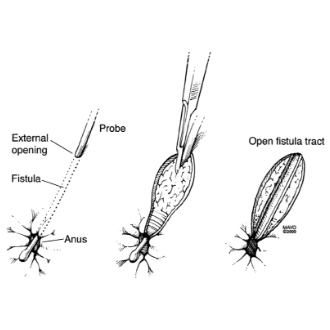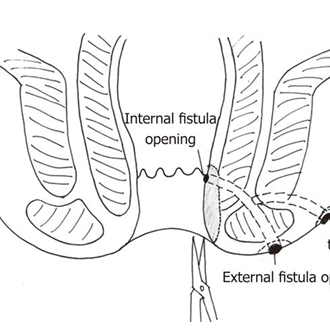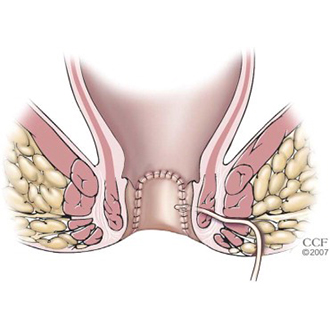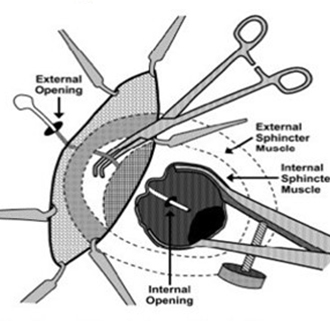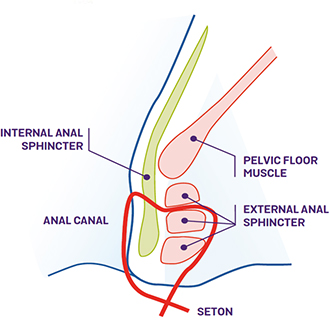An anal fistula is usually caused by an infection near your back passage (anus) that causes a collection of pus (abscess) in the nearby tissue. When the pus drains away, it can leave a small channel (fistula) behind. An anal fistula may also be associated with certain long-term bowel conditions.

Fistula Specialist Mumbai
What are the causes of anal fistulas?
Most anal fistulas develop after an anal abscess. Just inside your back passage (anus), there are a number of glands that make a fluid substance. These glands can become blocked and infected with bacteria (abscess). If the abscess increases in size it may form a tunnel leading to the skin around your back passage. This will then create a fistula leading from inside your back passage to an opening in the skin surrounding your back passage.
An anal fistula can also occur as a result of long term inflammation or infection affecting the bowel. This can also cause a tunnel to be formed from the lining of your back passage to an opening in the skin. Examples of long-term bowel conditions that can cause an anal fistula include Crohn’s disease and diverticulitis.
An anal fistula can also be caused following surgery or radiotherapy to your bowel and back passage.
There are a number of other possible causes of an anal fistula. These include cancer of the anus, cancer of the rectum, tuberculosis and HIV infection and AIDS.
What are the symptoms of an anal fistula?
Anal fistulas can cause unpleasant symptoms, such as discomfort and skin irritation, and won’t usually get better on their own. The symptoms of an anal fistula can include:
- Skin irritation around the anus
- Constant, throbbing pain. The pain may be worse when you sit down, move around, when you poo or when you cough.
- Smelly discharge from near your anus.
- Passing pus or blood when you poo (rectal bleeding).
- Difficulty controlling bowel movements (bowel incontinence); this is uncommon.
An abscess may form and this causes swelling and redness around your anus, and a high temperature (fever).
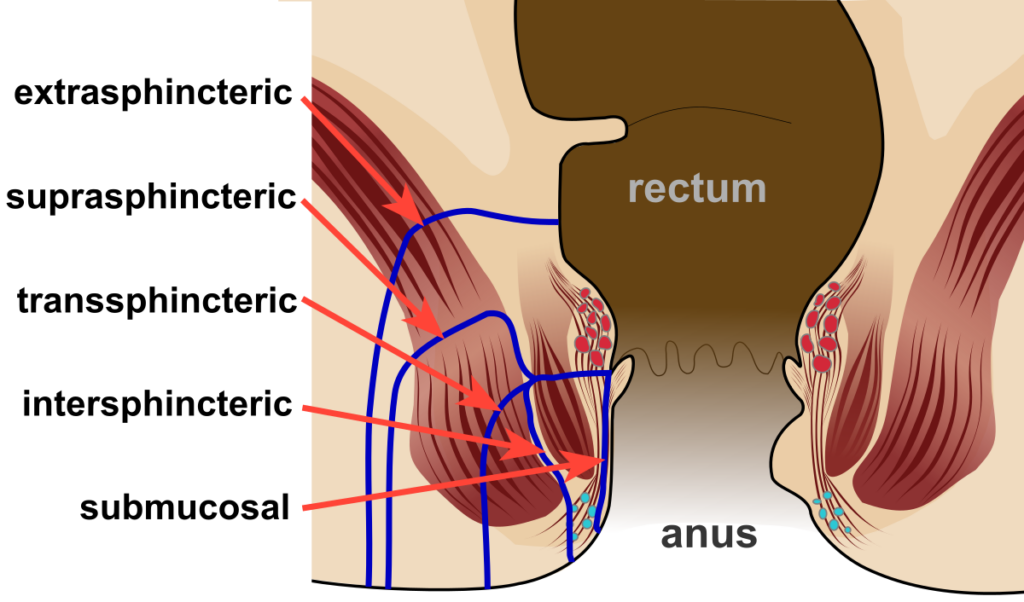
What are the tests for an anal fistula?
You should see your doctor if you have persistent symptoms that suggest you may have an anal fistula. Your doctor will examine your anus and gently insert a finger inside your back-passage (rectal examination) to check for any signs of a fistula.
If your doctor thinks you might have a fistula, they will refer you to a bowel specialist for further tests to confirm the diagnosis and to assess the most appropriate treatment. These tests may include:
- Proctoscopy – A special telescope with a light on the end is used to look inside your anus
- An ultrasound scan – magnetic resonance imaging (MRI), or computerised tomography (CT) scan.
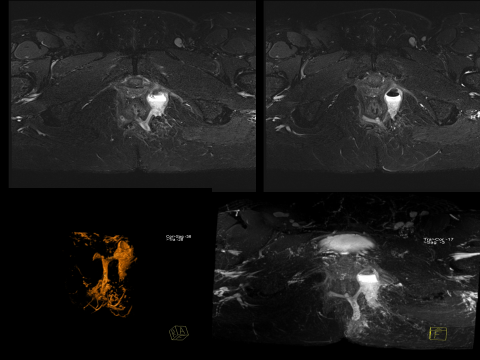
What are the treatments for an anal fistula?
An anal fistula will not heal without treatment and there are a range of different treatment options available. The first step is to treat any infection with antibiotic treatment. Anal fistulas then often require surgery. The main treatment options include:
Seton procedure
A surgical thread is placed through the anal fistula track and tied to form a continuous ring between the inside and outside openings of the fistula. The thread is left there for several weeks to allow drainage and prevent infection, and so help the fistula to heal. A further procedure is then needed to close the track.
Fistulotomy / Fistulectomy
This is a procedure that involves cutting open the whole length of the fistula or coring it out so it heals into a flat scar. It is the most effective method of dealing with a fistula and is the standard treatment for fistulas that are simple and don’t involve the sphincter muscle
Fibrin glue
Fibrin glue is a combination of fibrinogen, thrombin and calcium. It is injected into the fistula track. It heals the fistula by causing a clot to be formed within the fistula and then healthy tissue to form within the fistula.
Endorectal advancement flap
This procedure aims to cover the internal opening of the fistula. The internal opening of the fistula is removed and then covered with a small flap of healthy bowel wall that has been removed from the rectum.This is generally done for complex fistulas
Ligation of the intersphincteric fistula track (LIFT).
A skin incision is made and the fistula track is exposed and then tied and divided. a modification of this procedure, called BioLIFT, involves placing a biological mesh to prevent a fistula reforming. However, this needs a larger skin incision and increases the risk of infection. This is generally done for complex fistulas
Depending on which procedure you have, you may not need to stay in hospital overnight. Some people, however, need to remain in hospital for a few days after their surgery.
What are the complications of an anal fistula?
If the anal fistula is not treated properly then recurrent perianal abscesses and a complex fistula network may develop and this may cause pain, bleeding, faecal incontinence. Sometimes you can get cellulitis and sepsis if not treated in time
However surgery for an anal fistula can also cause complications. The main complications following surgery include infection, faecal incontinence and a further fistula developing.
Can an anal fistula be prevented?
You can greatly reduce your risk of an anal fissure by avoiding constipation and keeping your stools soft and going to the toilet to open your bowels as soon as you feel the urge to go. To help your bowel work properly and keep your stools soft, it’s important to drink lots of fluid and get regular physical exercise.
Surgical Options for Treatment of Fistula
We follow the latest advances in technology and evidence to offer the best surgery for the different grades of fistula so as to offer the best chance of cure
Procedure that we offer:
Fistulas can be of a wide variety and no single treatment fits all so you need to be well versed with all options for the best chance of cure
VAAFT and fistula plugs are now obsolete and at present have very poor success rates compared to the above techniques

